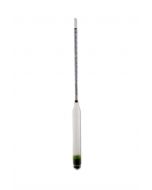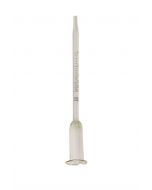Cidrometer / densimeter for cider weighing. The equivalent of the mustimeter but for cider.
The "degree of alcohol 0-13% vol" scale, , is only useful for weighing fresh apple juice (must) and knowing in advance what degree of alcohol will reach after complete fermentation.
The "density" scale, graduated from 1000 g/ml (top) to 1130 g/ml (bottom), is only useful for weighing cider during fermentation, and knowing, for example, when to bottle it, depending on the desired quality.
Supplied in a protective plastic case, with instructions and cider conversion tables. Can be used in any type of container (test tube, barrel, etc.) as long as the cidrometer can float in the liquid.
We recommend using a 500cc test tube for bottling (available on our website).

Use:
The cidrometer should be immersed gently in the cider. When it stops freely, you read the density according to the number appearing on the "desity" scale just where the device comes out of the liquid.
If you read 1025, you'll get sweet sparkling cider, for example
If you read 1018, you'll get sweet sparkling cider
If you read 1012, you'll get semi-dry sparkling cider
If you read 1005, you'll get dry sparkling cider.dry sparkling cider
So, if you like, you can bottle at different times to obtain different qualities. As time goes by, the density decreases and the alcohol content increases.
| Title2 | Part |
|---|







